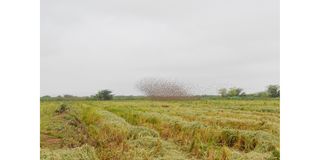Quelea birds wreak havoc on Bura rice farms

Quelea birds at a farm in Bura Irrigation Scheme, Tana River County.
Swarms of quelea birds have invaded and destroyed rice that was due for harvest at the Bura Irrigation Scheme in Tana River County.
The birds have reportedly destroyed more than 720 acres of rice farms forcing farmers to incur additional costs of hiring guards to scare them.
According to the farmers, the birds arrived on the farms towards the end of November.
"We woke up to find a swarm of birds on the farm, they had almost cleared one farm and we had to engage in chasing and hitting them with stones the whole day," said Mr Peter Mburu, a farmer.
According to Mr Mburu, some farmers will not harvest anything despite the investment they put on the farms expecting huge returns.
Mr Mburu had to hire five guards, each earning Sh300 daily to look after his farm.
"I have to position one person in each corner of the farm and another at the centre. Without doing that, I will have nothing to harvest," he said.
And Mr Daniel Wachira is yet to come to terms with the losses.
The farmer, who was expecting 200 bags from his four farms has only managed 70 bags, losing 130 bags to the birds.
He is worried about paying a loan he took from a bank to invest in the farm.
"I don't know how to recover from this. After a season of hard work, I go home with a very big negative balance, that means next season I will begin with paying debts," he said.
Ms Ann Mutemi, a first-time farmer, lacks words to explain her losses.
She only managed to harvest five bags from her one-and-a-half-acre farm.
The birds first landed on her farm where they spent nearly half a day before other farmers intervened in her absence.
"I don't know what to do and I'm even afraid to try again. This is Sh80,000 gone with the birds," she said.
Mr Steven Mutisya, a guard, wakes up at 5am as the birds start to arrive on the farm at 5:30am.
Armed with his sling and stones, and others with trumpets, they embark on chasing the birds until 7pm in the night.
"If they land in a field for three minutes, they rise with 200 kilograms of rice, and that is why we are here, our work is to ensure that they don't land even for a second," he said.
Mr Mutisya said they’ve tried erecting scarecrows which the birds are no longer scared of.
"They are intelligent. Therefore we have to remain innovative if we must keep our jobs and earn our salaries," he said.
The farmers have called on the state Department of Agriculture to intervene and save them from further losses.
"These birds are beyond our control, we cannot manage them but the government can deal with them, we are appealing for their help," said Hirimani MCA Ishmael Kodobo.
Bura Irrigation Scheme Manager Peter Orwa said the Agriculture Ministry has been informed of the bird's invasion.
"We have called for aerial spraying and we are waiting for a response from the state Department of Agriculture since this is beyond our capability," he said.
African nations have over the years spent huge amounts of money strategising on how to eliminate the bird, which, according to Africa Geographic, destroys thousands of tonnes of wheat, millet and sorghum every year.
It is estimated that there are 5.5 billion queleas in Africa, and that flocks ranging from one million to five million can consume 50 tonnes of grain a day.
The red-billed Quelea is a small weaver bird native to sub-Saharan Africa, and the most numerous bird species in the world.
The Centre for Agriculture and Biosciences International (CABI) profile of the bird, in its invasive species compendium, says the quelea is inherently nomadic, following rain fronts.
It is this migratory nature that sees it invade areas where it was previously absent.




